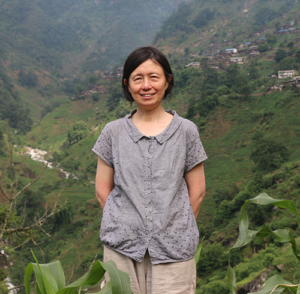
Dr. Jingqi Fu, SMCM Professor of Chinese, in Yunnan Province, Summer 2016
Dr. Jingqi Fu, Professor of Chinese at St. Mary’s College of Maryland, was awarded funding in April 2017 from the Endangered Languages Documentation Programme through SOAS, University of London for her project titled: Documentation and Preservation of an Endangered Ethnic Minority Language in China. Fu will travel to China extensively over the next three years to document the Lemo language that, to date, has no written script. “Lemo is the oldest dialect of Bai and is known to have separated from the Bai some 300-400 years ago,” explains Fu. “Its study will give clues as to the evolution of the Bai language as a whole.”
Dr. Fu’s linguistic research interests carry on work conducted by her mother, Lin Xu, who spoke the ethnic minority language of Bai during her childhood. Fu’s linguistic knowledge of the Bai dialect and structure, learned alongside her mother, provides a framework for the documentation effort she will lead as principal investigator on the three-year grant.
The research goal is both a linguistic study of the Lemo dialect and an enhancement of the status of Lemo language and culture. According to Fu, the Chinese government wants to document the culture by way of costumes in a museum but is not trying to keep the culture (and language) alive. The Endangered Languages Documentation Programme “supports keeping endangered languages alive and emphasizes that their documentation should be done in natural, everyday settings and situations, to best characterize the language and its cultural role” Fu remarks. All recordings will be archived in the Endangered Languages Archive at SOAS and thereby preserved for posterity. The archive makes this invaluable resource available to the community, the public, and to the scientific community.
Fu spent three weeks in China during the summer of 2016 to prepare for the project, with the work beginning in earnest in summer 2017. A second summer in 2018, followed by a five-month stretch during spring 2019, will bring the project to completion.
Fu is principal investigator but will enlist a team to help with the research and data gathering. Representatives from the Yunnan Nationality Affair Commission and Dali Bai Research Institute, plus a technician and speaker-consultants recruited from the Lemo Community in Nujiang will form the research team.
The first two weeks in Nujiang will be spent making contacts with relevant people and conducting a week-long workshop on language documentation for speaker-consultants to learn to document their own language and culture. Afterwards, team members, equipped with recorders and cameras will gather data in different Lemo-speaking villages. Members will film and record in a variety of settings and contexts: story-telling, interviews, folksongs and dances, speeches, everyday situations, and, if permitted, religious ceremonies.
Once audio/video is captured, researchers and speaker-consultants will work to transcribe the data using open source software developed to annotate text, audio, and video media and generate the lexicon/dictionary of the language. In addition to the dictionary, the team will also build a grammar sketch. Both the dictionary and grammar sketch use data generated from the recorded audio/video. A working orthography (the way a language is expressed in written form, with symbols, punctuation, spelling) will be developed together with the Lemo community and a short language manual will be made based on the orthography. The manual, intended for first-grade children, will include cultural material relevant to their living environment.
Fu is grateful for the support she’s received to get this research funded. A summer grant from the St. Mary’s College Board of Trustees enabled her to travel to China this past summer in preparation for the work she’ll do under the current grant.
Fu has taken SMCM students on study tours to study and interact with Yunnan minority groups including Bai, as recently as 2015. In 2014, her students Megan Dower ’14, Naomi Garcia ’15, and Meng Fei Chen ’16 helped with the research on folksong translations.
